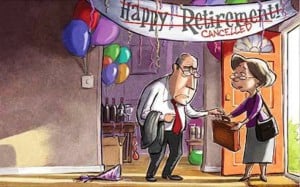 I came across this story not long ago about a man in Ontario who had his credit rating ruined by Rogers even though he has never had a Rogers account. I know this sounds unbelievable but Mr. Dave Johnson of Pembroke, Ontario has spent three years fighting a Rogers Bill that isn’t his. This story is a perfect example of why it’s so important that you are aware of your credit score and credit rating and check it periodically.
I came across this story not long ago about a man in Ontario who had his credit rating ruined by Rogers even though he has never had a Rogers account. I know this sounds unbelievable but Mr. Dave Johnson of Pembroke, Ontario has spent three years fighting a Rogers Bill that isn’t his. This story is a perfect example of why it’s so important that you are aware of your credit score and credit rating and check it periodically.
Rogers like many large companies outsources the collection of accounts that are in default to collection agencies. According to the Government of Canada you must be notified in writing that your file has been given to a collection agency. In this case Dave Johnson never received notification from the Rogers collection agency that his account was in default because he never had a Rogers account. Never-the-less, in 2010 he received a $5,400 bill from a Rogers collection agency working for Rogers Wireless. Mr. Johnson knew he wasn’t in arrears and contacted the collection agency letting them know that he didn’t have a Rogers account and that somewhere there was a clerical error. The collection agency seemed to be very reasonable and Mr. Johnson believed that the matter had been cleared up. Big mistake! The $5,400 debt to Rogers Wireless ended up on his credit record and as a result of this, leading to a poor credit rating:
- He was turned down for credit cards.
- He wasn’t allowed to co-sign for his son’s mortgage.
- He couldn’t use the equity in his home.
In the process of trying to clear his name and restore his credit, and his credit rating, Mr. Johnson discovered that another man, also named David Johnson, has also been wrongly pursued for the very same bill. The reality is that the Rogers collection agency clearly didn’t have a file with accurate information of the debtor. They were going after anyone and everyone who had the same name, which unfortunately for the David Johnsons in Ontario, is quite common.
Rogers is not taking any responsibility for this problem. They are blaming the Rogers collection agency. In case you think that this is an isolated incident, CBC News received dozens of complaints last year about how collection agencies aggressively pursue unpaid debts. Howard Maker, Commissioner of Telecommunications Complaints, has confirmed that he is aware of this ongoing problem.
If you are being legitimately pursued by collection agencies because you’re experiencing serious financial difficulties and you are concerned about your credit rating, contact Ira Smith Trustee & Receiver Inc. We can help and Starting Over, Starting Now you will gain back your former quality of life. Watch for our next blog when we’ll be discussing Common Credit Score Mistakes.






